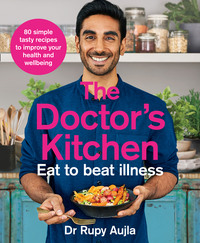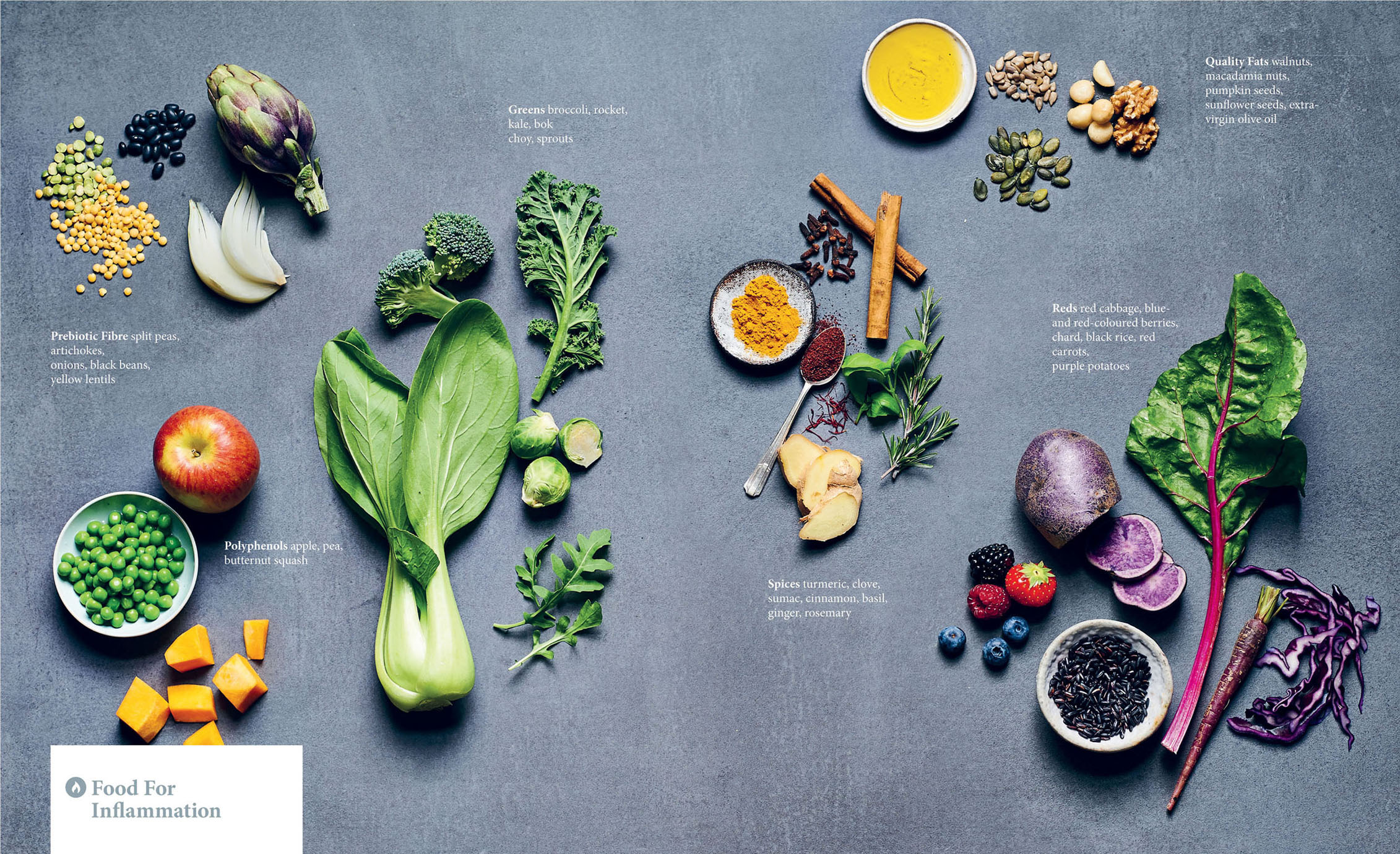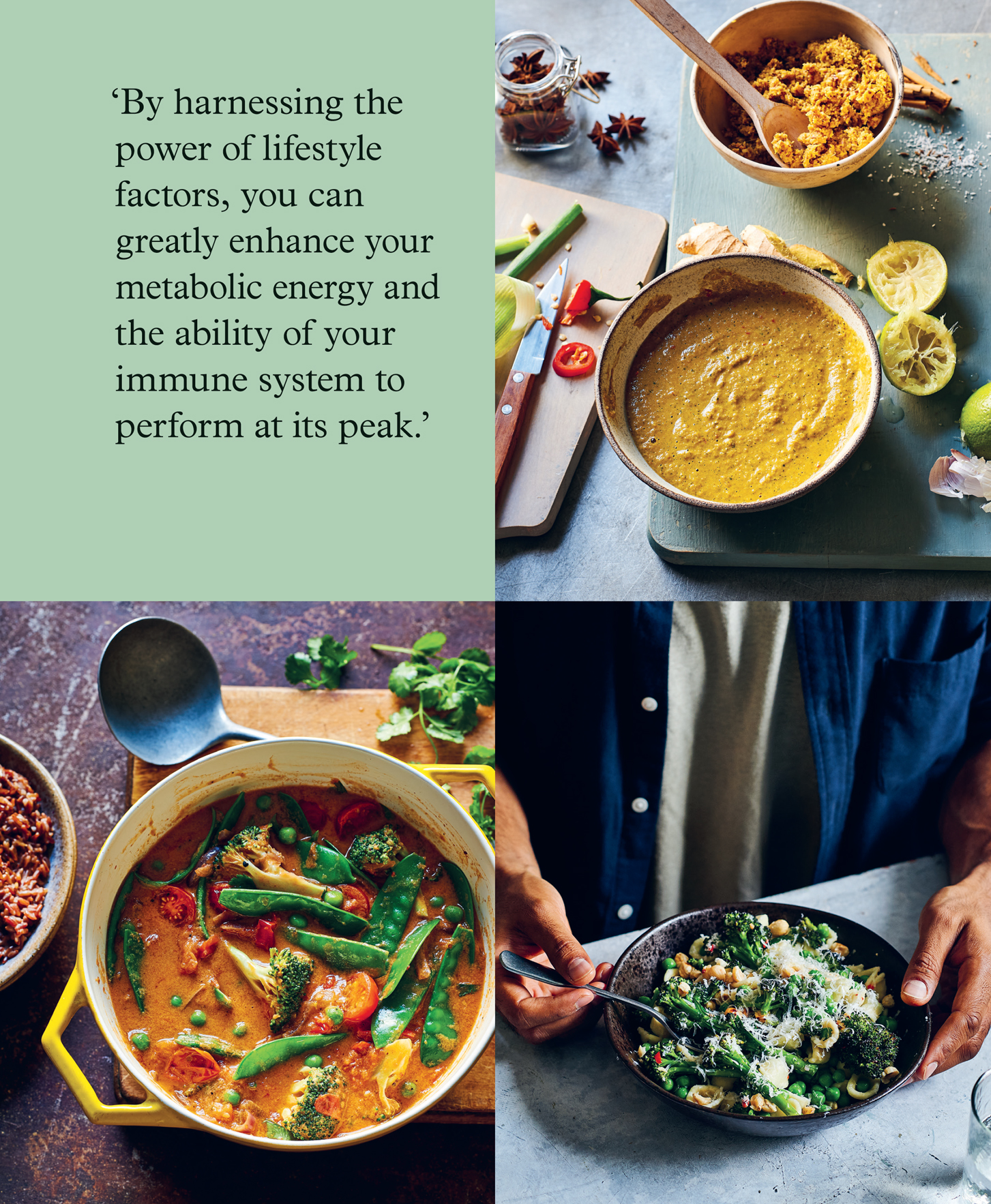
The Doctor’s Kitchen - Eat to Beat Illness
If we can harness the incredible effects of not only our food, but the anti-inflammatory potential of our lifestyle, we could drastically reduce the problems that excess inflammation poses to our health. What this chapter represents is a medicinal package for many patients without the need for strong drug interventions. We will always need pharmaceuticals and as a doctor I do not hesitate to use them where appropriate. But the primary consideration should always be what we put on our plates and the way we live. These should be the first therapeutic interventions before we entertain more invasive measures that can carry a greater risk versus benefit.


Immunity


The purpose of this chapter on immunity is to get you thinking about immune health in a different way. Rather than thinking of immunity as an isolated system that requires ‘boosting’ with individual ingredients, think about it from the perspective of making healthy lifestyle choices to build your metabolic and energy reserve. This strengthens all of the specialised cells and organs needed to support your body’s natural immunity and homeostatic mechanisms.
Your immune system is a collection of proteins, organs and parts of the body that work in unison to protect us from harm. This includes everything from the acid found in your stomach to prevent harmful bacteria invading your gut, to the thick protective protein layer of your skin that physically keeps harmful microbes out. Immunity also includes the complex network of specialised cells that work in superb coordinated sequences to maintain the harmony of your internal ecosystem.
We need a resilient immune system to protect us from infective organisms like viruses and bacteria, but we also rely on this complex network to protect us from the malfunctioning of our own cells. Immunity is traditionally thought to be just our defence system, protecting us from harmful microbes that live in the external atmosphere, but it also ensures the correct functioning of our internal environment. Our immune system is responsible for identifying and appropriately clearing away mutated or malfunctioning cells that can lead to, for example, inflammation and uncontrolled growths that can become tumours.
Trillions of times a second, chemical reactions are occurring in your body and as a product of normal metabolism and sheer probability, some cells are created that are malfunctioning or damaged.126, 127 In addition, normal radiation from the sun or environmental pollution from smoke inhalation can also damage your skin and lung cells respectively and this needs to be dealt with. We rely on our body to clear these damaged cells effectively, so they don’t lead to further negative effects. This is the job of our wonderful immune system. It is what we depend on to carry out these processes and it does so with beautiful precision and efficiency without us having to think about it.
The wonderful thing about our immune system is that it is everywhere. You might think of our detoxification system as our liver and kidneys, or our mental activity centre as our brain, but our immune system has to be prepared to step into action at any site in the body. Whether it’s to protect us from a skin-cut to the leg that could be an entry point for bacteria invading the bloodstream, or recognising a malfunctioning cell in an organ and clearing it away so it doesn’t develop into a growth, your immune system is ready.
I hope this gives you a broad idea of the magnitude of immunity and why simply eating or medicating ‘to boost’ it is a misnomer. I appreciate it’s a nice idea and an easy-to-understand concept; you eat something, it ‘boosts your immunity’ and you become a common-cold-kicking superhuman. But in reality, our bodies do not work like that. Our vast interconnected systems of cells do not simply respond to one element like Echinacea or zinc. It is called your immune system because it is an incredibly complex network of cells that require balance and harmony, and for this reason alone I hope you can already appreciate that there is no ‘silver bullet’ nutritional supplement or pharmaceutical product that magically improves your immune health.
GUT HEALTH
There are particular sites in the body where immune cells interact with each other and are developed, including the bone marrow, the spleen in your abdomen and lymph nodes dotted around your body such as the neck and groin. Of particular anatomical significance, however, is our gut. Our digestive system is the closest contact to the outside world. Everything we eat and drink from our environment is covered in microbes and we have been in constant communication with them in our environment throughout our evolution via this 30-foot long tube. But rather than being fearful of them, it’s important to realise that most of the microbes that live in our digestive tract are integral to our health. Our microbiota, the population of microbes including viruses and fungi but predominantly bacteria, are mostly situated in the large intestine. As we have discussed, this huge population of foreign cells is responsible for digesting food, releasing vitamins from ingredients and maintaining our health128 (see here). The lining of the gut has to be super thin so the products of digestion and metabolites from gut microbe activity can pass through into the blood in order to be transported around the body.
The thin gut lining facilitating transfer of nutrients is necessary, but it’s also a route for harmful microbes and products to pass into our blood which could lead to damage, therefore our immune cells need to be constantly assessing and recognising friend from foe in these areas. It is relentless work to keep our human cells in harmony with foreign microbes, as well as detecting which of these organisms we need to get rid of. This is why so many immune cells are concentrated in our digestive tract and it explains why the gut has the largest amount of ‘lymphoid tissue’ that contains cells of the immune system.129
So, instead of simply using the analogy of an aggressive military force to describe our immune system, I like to see our immune cells as having just as much of a peacekeeper role in the complex world that is your human body. This is because the majority of cells contained within the body don’t actually belong to us. Microbial cells outnumber our own human cells and our health, particularly our immune health, depends on us keeping this population of microbes thriving. This objective is best served with a diet and lifestyle that nurtures them.
Having a robust and well-functioning gut population protects and bolsters our ability to deal with infections on several levels. Specific gut microbes maintain the integrity of the gut wall, preventing harmful pathogens or materials inappropriately entering the bloodstream. They secrete their own antibiotic and anti-fungal chemicals that attack harmful microbes, preventing them from colonising the gut. Beneficial microbes support an anti-inflammatory environment, which again is why good gut health improves cardiovascular disease and diabetes. The microbes themselves produce and release micronutrients that support our immune cells as well as protecting us from harmful environmental toxins.130 Keeping our microbiota in shape improves our immune health and involves eating colourful vegetables, fibre and a wide variety of whole foods. Dishes such as the Ethiopian Berbere Curry (see here) or the Pea Orecchiette (see here) are great ways to achieve this.


AUTOIMMUNITY
Because of a general recognition of the importance of the gut microbiota in immune-related diseases, researchers are increasingly looking at gut-focused treatments for problems related to imbalances in our immune system. Sometimes our immune cells can inappropriately send signals to fight infection or attack normal human cells that are perceived as foreign. This is a simplified explanation of autoimmunity which is different to something like hay fever or dust-mite allergy, which is an exaggerated immune response.131
It’s recognised that those who suffer from autoimmune conditions including psoriasis and rheumatoid arthritis tend to have imbalances in their gut populations.132 The research is still in its early stages but we also recognise that those who suffer from exaggerated immune responses, like in the case of asthma and eczema patients, may lack certain populations of gut bacteria that harmonise the body’s immune response.133, 134 This has led to the hypothesis that repopulating the gut microbiome with beneficial microbes may improve symptoms.
A theory gaining popularity to explain one of the causes of some autoimmune (AI) diseases is that the immune cells have been exposed to products that have entered directly into the bloodstream via ‘gaps’ in the lining of our digestive tract.135 These products have not been properly processed and identified by the immune system cells within the gut, and thus trigger an aggressive response that leads to harm of the normal tissue. It’s still under a lot of debate but it’s interesting to note that gut-focused treatments for AI disease, where potential triggers have been removed allowing the gut wall to repair itself, have led to some remarkable results.136, 137 I don’t have the space to dive into a full discussion of such a nuanced topic in this cookbook, but there is some interesting research on the horizon as well as a lot more we have to learn about process behind AI conditions and therapeutic dietary strategies. I suspect that it is more complicated than just nurturing the microbiome, but ensuring a healthy and thriving gut population using food could be a good starting point for helping with these illnesses and a lot of well-respected scientists in the field are in agreement on this.
ELIMINATION DIETS
It’s my responsibility to be honest about the validity of these interventions and assess whether you could benefit from them. There has been a lot of speculation regarding AIP (autoimmune protocol) diets and, although these appear to be restrictive and eliminate perfectly healthy items from your food, there have been some interesting and significant outcomes gained from their use. Depending on the condition, these short-term therapeutic dietary interventions may be beneficial, but I hasten to add that they should be actioned with the guidance of an experienced practitioner. I’m mindful of the scaremongering tactics surrounding components of food: gluten in flour, lectins in beans and other common ingredients. My advice is to maintain a high suspicion of anyone blatantly brandishing a single food as harmful for everybody and making outlandish and unhelpful claims. It makes no scientific sense to suggest gluten is bad for all citizens of the UK, for example, and I discussed the many reasons behind this in my first book. But I do believe there is a case for some patients to trial dietary strategies and many rheumatologist and immunologist colleagues are starting to use them carefully with interesting anecdotal successes.
MITOCHONDRIAL SUPPORT
In recent years, we’ve also begun to recognise the profound importance of a component of our cells called mitochondria. These are found in all of our cells and have been traditionally referred to as the ‘powerhouses’. These incredible batteries provide energy for all normal cell functions, but they’re also critical for recognising when an immune response is required.138, 139 Cutting a longwinded biology lesson short, we require healthy, functioning mitochondria for a robust immune system that can boost its metabolic activity to adapt to the increased demands of when your immune system needs to be more active. Whether it’s fighting an infection or balancing oxidative stress, your immune cells require more energy, and mitochondria are key to this. Supporting your mitochondria by preventing damage and providing them with fuel is therefore an essential immune-supporting strategy. Things that damage mitochondria include high-sugar diets and stress, and this gives us one explanation as to why poor diet and mental pressure appear to have detrimental impacts on our immunity.140
This is a very new area of research, so the evidence base behind what to eat for mitochondrial support is lacking, but that shouldn’t stop us from being able to make reasonable, educated adjustments to our lifestyles that we can be sure are safe. Even if we cannot accurately determine that they are specifically supporting mitochondria, they are certainly beneficial to your body in many other ways.
However, diet related to immunity is a difficult topic to tackle. Unlike cardiovascular disease or diabetes, there aren’t many studies examining the effects on immunity nor biomarkers that we regularly test to check someone’s immune capacity.141 However, the suggestions below encompass the entire ethos of this book: to give you reasonable evidence-based suggestions, with a good dose of common sense, about how your lifestyle can enhance the functioning of your incredible body. These delicious ingredients will get you thinking about how nutrition is exceptionally important to building your immunity.
‘There are added benefits of obtaining vitamin C plus the abundance of other vital micronutrients from whole foods rather than supplements in isolation.’
+ Orange, yellow and green foods Bright orange and yellow-coloured foods, including winter squash and sweet potato as well as dark greens such as kale, contain vitamin A precursors called carotenoids. These plant chemicals are essential to our immune system and have a role in maintaining our gut barrier, the functioning of specialised immune cells as well as the cells involved in the immediate response to stressors.142 We also find different sources of vitamin A in animal products such as fatty fish and organ meats we don’t tend to consume much of, such as liver. Try the Fennel Sardines with Pine Nuts (see here) or the White Beans, Butternut Squash and Spicy Couscous (see here).
Along with vitamin A, brightly coloured foods also contain vitamin C, as do a number of green vegetables including broccoli, parsley, spring greens and Brussels sprouts, and by lightly steaming them (a technique I use regularly in my recipes) we can maintain this vitamin content. It’s long recognised that vitamin C is important for immune cells.143 It can aid your ‘first response’ immune system activity and vitamin C itself is a strong antioxidant which is important to protect your immune cells and limit the oxidative stress within your mitochondria.144, 145
For these reasons, many of my patients have bought into the advertising for vitamin C supplements. Although I believe these are fairly safe and well tolerated, there are added benefits of obtaining vitamin C plus the abundance of other vital micronutrients from whole foods rather than supplements in isolation. There are a huge range of other nutrients contained in dark leafy greens and citrus fruits beyond just vitamin C. For instance, a pile of steamed greens with olive oil, salt and lemon (like my Horta recipe here) would be a fantastic accompaniment to most meals as it doesn’t just offer vitamin C; it delivers sulforaphane, magnesium and added fibre to your diet. I encourage people to think of their food as a wonderful collection of thousands of micronutrients and plant chemicals rather than just one or two vitamins.
+ Nuts and seeds Nuts like cashews, almonds and Brazil nuts, as well as sunflower seeds and flaxseed, contain good sources of zinc, selenium and vitamin E. These three micronutrients have individually been studied in clinical trials using larger doses than found naturally with some positive results on immune health, which is why they’re labelled ‘immune boosting’ in many stores.146, 147, 148 However, I believe using supplements of individual micronutrients in large quantities is for the majority of people unjustified. Certain populations who may be at risk of deficiency and have lowered immune health, such as the elderly, may benefit from supplemental forms but we can obtain reasonable amounts of these essential nutrients from wholesome, delicious food. Not only do I use nuts and seeds to add texture to food, but they’re fantastic sources of protein and fibre that additionally contribute to immune health. Try the Herby Walnut and Cashew Roast (see here) for a great way of using more quality fats.
+ Fibre An effective strategy to improve our immune system would be anything that helps our gut environment; specialised prebiotic fibres including chicory, endive, Jerusalem artichoke and garlic provide your microbes with a source of food. When digested, they’re able to make a fatty acid chemical called butyrate which helps maintain the lining of the gut wall.149 A well-fed microbiota is better equipped to carry out its immune-modulating role of reducing inflammation and preventing pathogenic microbes from colonising in the gut, causing ill health.
+ Herbs and spices A variety of vegetables, like the colourful ingredients described above, also provide a fantastic food source for the microbes and there is also a rationale for using plentiful herbs and spices. Ginger, turmeric, fennel, and some botanicals like peppermint may have a role in immune support as they have been shown in some small studies to reduce gut inflammation.150 I think regularly including herbs and spices in our food for a culinary as well as functional purpose is an important aspect of our diets that we should embrace. Try the Ras el Hanout (see here) or the Laksa Paste (see here) for ideas.
There are some specific botanicals and herbs that have shown ‘immune modulating’ capacity, in that they may stimulate the production of cells of the immune system.151 There is also a tradition of using different herbs for immune support across many cultures, including elderberry, Echinacea, mushroom varieties and probiotics. However, I would rather we focus on accessible diet and lifestyle aspects that serve to build your immune reserve rather than relying on immune-modulating plants for general sustenance. Improving your lifestyle and diet are much more powerful strategies than relying on a special flower or fungi for support.
LIFESTYLE 360
Nutrition has a huge role in maintaining robust and balanced immunity, but if there was any system that exemplifies why total coordination of lifestyle factors, such as exercise and sleep, is necessary for universal functioning, your immune system is the poster boy. By harnessing the power of a variety of lifestyle factors, you can greatly enhance your metabolic energy and the ability of your immune system to perform at its peak. It will not only improve your resilience to common viruses and pathogens, but also aid inflammation balance under the control of immune cells.
+ Exercise For everyone there is an exercise sweet spot. Regular moderate exercise has been shown to universally benefit immunity. Aerobic exercise actually encourages your body to be more resilient to stressors and therefore has an overall benefit, despite the short-term effects of exercise being inflammatory.152 Aerobic exercise can actually improve your mitochondrial function which may also be why regular exercise builds a resilient immune system.153, 154
Persistent over-training, however, is associated with reduced immune reserve. There are recognised health risks of putting high amounts of strain on your body by over-exercising, that researchers have observed in endurance athletes like cyclists.155 A balance of training is what we should be aiming to achieve and there are specific types of exercises that may be particularly good for immune health.
+ Yoga Described as both a mindfulness technique as well as a form of exercise, recent studies on yoga have examined a fascinating effect on immune cells.156 Researchers have demonstrated that yoga practices can impact the expression of genes to one that positively improves immune cell function. Similar effects have been shown with other practices such as Qi Gong and Tai Chi.120 Combined with the physical benefits of the exercise, yoga could be one of the best all-round immune health promoting activities we know of. The best advice I have is to mix it up. I have developed my own yoga routine from watching online yoga sessions that are very accessible and easy to follow, as well as attending classes now and again to get some pointers. But I would also encourage HIIT (high intensity interval training) sessions, too, to improve aerobic capacity, as well as endurance training such as cycling and swimming for their additional benefits.
+ Meditation The gradual deterioration of our immune capability as we age, known as immunosenescence, may be closely related to both psychological distress and stress hormones.157 It would stand to reason that techniques to reduce stress effects may be beneficial from an immune perspective. Combined with the many positive effects of mind–body interventions, practices such as deep breathing, transcendental meditation or simple walks in nature are a no-brainer for me to advise. I was pleased to read a paper about the positive effect of walking in nature, specifically on cells of the immune system.158 So perhaps the most immune-system-enhancing of activities could be a yoga session in a park followed by deep breathing in natural sunlight. And this brings me nicely onto the subject of vitamin D.

+ Vitamin D More than a vitamin, vitamin D acts as a master hormone that regulates a multitude of genes involved in a huge number of processes. Beyond its well-recognised involvement in bone health and calcium regulation, vitamin D has a very important role in immune health.159, 160 In both the initial ‘innate’ response to infections and the more specific ‘adaptive’ responses, scientists are researching the role of vitamin D and its importance to auto-immune conditions. There are very few sources of vitamin D in the diet and thus medical practitioners in the UK have taken to recommending vitamin D for the whole population during winter months and for those with darker skin colours. The best advice is to get adequate sun exposure outdoors, have regular tests by your GP if you’re at risk and take a supplement during the darker months of September to March in the UK.
+ Sleep deprivation It will come as no surprise to many people that sleep deprivation drastically lowers a person’s immunity. Your immune system is very likely to be regulated by routine and the sleep–wake cycles which influence all other cells in your body operating on a rough 24-hour cycle.161 This is why sleep is integral to a healthy immune system. As a GP, I’ve lost count of the number of people turning up on a Monday suffering acute tonsillitis directly attributable to late nights at the weekend or travel. But this is just the tip of the iceberg. Persistent sleep loss significantly disrupts your immune system, increasing inflammation which drastically raises the risk of chronic illnesses like heart disease, Type 2 diabetes and even cancer. As you can probably appreciate by now, these are all conditions related to an ill-performing immune system. Achieving 7–9 hours of sleep a night could be considered one of the most potent therapies for improving ones’ immune system and it’s definitely on my prescription pad.